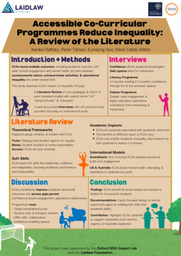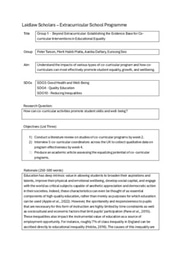To What Extent do Co-Curricular Programs Reduce Inequality: A Review of the Literature
Abstract:
This study explores the link between co-curricular activities (CCAs) and educational opportunity through a literature review and two interviews with third-party providers. The authors explore philosophical justifications for educational priorities and use both international and local models of CCAs to investigate how such activities can mediate inequality in the current UK school system. Furthermore, they outline the varied outcomes of CCAs, assessing differing impacts on academic and soft skills observed in the literature. The two interviews with academic co-curricular providers in the United Kingdom offer new insights that refine our understanding of the intellectual, social, and psychological dimensions of student outcomes and provide insight into the complex interplay of group dynamics, economic accessibility, and teaching quality needed to sustain an effective co -curricular program for underserved students. The authors highlight gaps in the literature related to the causal mechanisms behind co-curricular benefits, and the related analytical challenges caused by unequal participation in co- curricular activities across socioeconomic groups. The authors also offer a blueprint for further research that directly incorporates youth voices and compares different dimensions of systemic inequality. Finally, they recommend that teachers, leaders, and policymakers can help address educational inequalities by tackling student engagement and the socioeconomic barriers to co-curricular participation.


Please sign in
If you are a registered user on Laidlaw Scholars Network, please sign in